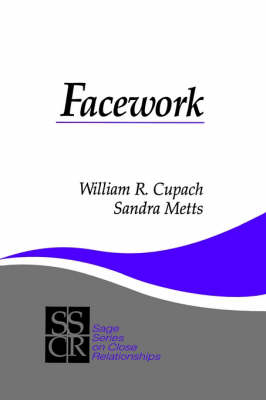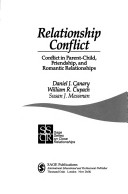SAGE Series on Close Relationships
3 primary works
Book 5
Self-Disclosure
by Valerian J Derlega, Sandra M. Metts, Sandra Petronio, and Stephen T. Margulis
Published 1 March 1993
Although self-disclosure is not equivalent to and does not define the level of intimacy in a relationship, it is a major factor in the relationship′s development, maintenance, and deterioration. Conversely, the level of closeness between relationship partners (whether the individuals are acquaintances, friends, lovers, or relatives) affects the meaning and impact of disclosure. Compelling and informative, Self-Disclosure focuses on the role of self-disclosure in close relationships and illustrates how individuals negotiate with their relationship partners--what, when, where, and how they communicate personal feelings and thoughts. The authors examine how close relationships and self-disclosure are mutually transformative; where self-disclosure and relationships mutually interact to affect one another; how subcultural differences between males and females influence self-disclosure in relationships; how the vulnerability and risk associated with disclosing personal information leads relationship partners to be concerned about privacy regulation; and how stress-reducing disclosure, associated with the willingness to talk about stressful events, provides both a means of coping with unpleasant life events and access to social support. With sensitive coverage of the major themes of self-disclosure, this volume is ideally suited for students, researchers, and practitioners interested in close relationships, interpersonal communication, social psychology, gender studies, family studies, counseling and clinical psychology, social work, and sociology. "For someone looking for a good review of the literature on self-disclosure and close relationships, this book fits the bill, providing a quick and easy way to sort through theory....for the researcher, the authors provide questionnaire materials in most chapters to illustrate how data might be collected." --Families in Society
Book 7
Designed to acquaint readers with the most up-to-date information on close relationship theory and research, Facework provides a thorough examination of the authors′ research, as well as that of others, on the self-aspects of communication in intimate relationships. Gaining face, maintaining face, and losing face all have numerous implications in the management of close relationships. Cupach and Metts make a compelling case for facework as basic relationship currency at any stage of a relationship, whether it be formation, maintenance, or disengagement. Written in a clear, humorous style, Facework offers the reader a very pleasurable learning experience and the opportunity to gain deeper insight into the management of problematic situations occurring in close relationships. Professionals and scholars in psychology, sociology, communication, family studies, and social work will find Facework a stimulating, informative, and indispensable volume.
Book 10
Relationship Conflict
by Daniel J. Canary, William R. Cupach, and Susan J. Messman
Published 23 August 1995
Relationship Conflict is an excellent contribution in the tradition of Sage′s series on close relationships. Like the other books in this series, Relationship Conflict provides a concise and compelling synthesis of research and thinking on a particular aspect of intimate relationships. In this case, Daniel J. Canary, William R. Cupach, and Susan J. Messman provide an accounting of conflict of text. As such, this volume constitutes the perfect companion text to undergraduate courses on interpersonal conflict. The clarification of definitions of conflict and approaches to studying conflict in chapter one is a particularly useful framework for organizing the wealth of research on relationship conflict. Similarly, the review of methods for studying conflict in chapter two is a concise assessment of the pros and cons of different methodologies. The remaining chapters nicely synthesize research illuminating conflict in parent-child, friendship, dating, and marital relationship contexts. The consistent limitation in traditional textbooks for the undergraduate course in interpersonal conflict is a failure to include a review of research on conflict in different relationship contexts; Relationship Conflict fills that gap and quite satisfactorily. --Denise H. Cloven in Personal Relationship Issues "The theories, research, analysis, and conclusions will interest a wide range of readers in communication, family studies, psychology, and sociology. Graduate through professional." --Choice "This is an excellent book which should be read by all those in the business of helping couples in their relationships. I can also see a clear role for parts of this book... as providing the basic reading for training seminars." --Padmal de Silva in Sexual and Marital Therapy "My favorite features of the book are the inclusion of different types of relationships and a developmental perspective on relationship conflict. . . . Relationship Conflict provides an easily readable overview for those newly interested in interpersonal conflict and for those working on conflict in formal or business relationships." --Renate Klein in Journal of Marriage and the Family Conflict is a natural, even inevitable, aspect of most ongoing close relationships--a given. What distinguishes most successful relationships from unsuccessful ones is not the absence of conflict, but how conflict is managed. Relationship Conflict skillfully portrays the different types of conflict that we encounter in our most significant personal relationships: parent-child, friendship, and romantic relationships. The authors capture the essence of current research and theory to shed light on conflict′s role in human interaction. Drawing from the findings of multiple disciplines, this volume takes a developmental look at childhood friendships through dating to married relationships. The result is a richer understanding of interpersonal involvement that is accessible to close relationship researchers and professionals and students in many service-based fields. Relationship Conflict provides up-to-date information on interpersonal conflict pertinent to many different disciplines: researchers as well as advanced undergraduate and graduate students in communication, family studies and human development, and sociology and professionals in psychology, social work, and nursing.


